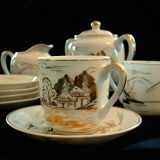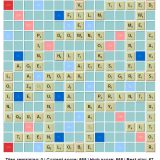History Lesson, Present Tense?
“Liberty is rendered even more precious by the recollection of servitude.”
~Cicero
Laura and I have resumed our regular schedule now that the holidays are truly over. Our history lesson today, to me, read something like our modern times….
“The transformation of Rome from an Italian city-state to the seat of a vast empire created a host of new problems…Before…Most people lived simply and modestly; a Roman “noble” might even do his own plowing. Patriotic citizen soldiers were ready to fight for the honor and glory of the city that gave them freedom and prosperity. But Rome’s successful wars and overseas conquests gradually washed away the foundation of the republic, eroding the old Roman character traits of simplicity, discipline, hard work, and patriotism. The Roman family began to disitegrate as divorce became increasingly common and immorality flourished.
Moral breakdown was accompanied by economic decline, for as the empire grew, the vast majority of ordinary Roman citizens became extremely poor. The abundance of cheaper foreign grain that now poured into Romain ruined many farmers in Italy, forcing them to sell their land and move into the city in search of work. But the growing number of slaves in Romain made competition for jobs fierce, and many displaced farmers found themselves among the growing mobs of the discontented, impoverished, and unemployed. In contrast, a few wealthy Romans profited greatly from the situation. Buying up the lands vacated by the small farmers, these men created vast estates farmed by slave labor. By the beginning of the first century B.C., fewer than 2,000 men owned all of the land in Italy. Others made fortunes in businesses that had been organized to do work for the Roman government. Since these businessmen also controlled the government, they were able to receive a much higher price for their services than they deserved.
By the first century B.C., Romain society was divided into two hostile groups. At the top of the social ladder sat a few very wealthy men who controlled most of the land and money in Rome, and at the bottom stood multitudes of poor people who clamored for free food and entertainment (“bread and circuses”). Corrupt Roman politicians gave the people what they wanted, but only to buy their votes, never considering the effect their actions would have on Roman society. Handouts of bread squelched what little remained of the Romain ideals of personal initiative and self-respect, while the circuses fed one of the darkest hungers of depraved human nature-to take pleasure in the pain and suffering of others. Every day, thousands crowded into the circuses to watch the gladiators [prisoners of war, slaves, or criminals forced to fight in public show] fight men and beasts to the death.
…While the common people demanded economic, political, and social reforms, the aristocrats who controlled the senate opposed any measures that threatened their entrenched wealth and power. In this atmosphere of conflict, ambitious men strove for power–some by appealing to the masses as the “voice of the poor”…”
If this isn’t present day, I don’t know what is.
From A Beka’s World History and Cultures, 1997















